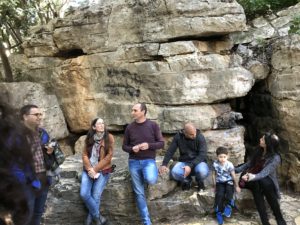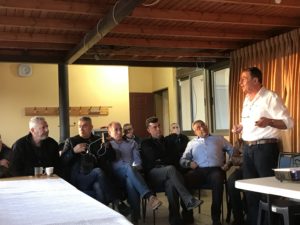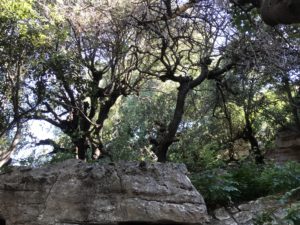Third Planners Course Has its Final Meeting
 The third cohort of the Urban Planners as Change Agents course which we hold in cooperation with the Arab Center for Alternative Planning had their final meeting on March 16-17. The group which included 25 professionals, Jews and Arabs, had their final meeting during a weekend in the Arab village Al-Bkei’a in the Upper Galilee.
The third cohort of the Urban Planners as Change Agents course which we hold in cooperation with the Arab Center for Alternative Planning had their final meeting on March 16-17. The group which included 25 professionals, Jews and Arabs, had their final meeting during a weekend in the Arab village Al-Bkei’a in the Upper Galilee.The first day included a panel about a successful land plan in the area, with the help of the Arab Center for Alternative Planning. The panel was made up of Head of Council Sweid Sweid, the Architect Ibrahim Dweiri, and the appraiser Radi Nijm.
On the Second day the group went on a tour in the village. During the tour they met with Grandma Jamilah, who told her story of overcoming societal constraints and going on to build an international cosmetics company. After meeting with Grandma Jamilah the group visited a conservation project by architect Abed Yassin in the center of the village. Finally the group stopped by the carob tree under which Rabbi Simeon Ben Yohai sat, and heard about the shared life between Muslims, Druze, Jews, and Christians in the village. At the end of the day we had a discussion summarizing the entire year, after which the participants received their certificates.
“The course was a rare opportunity for a meeting between two sides who hardly ever meet. It gave me the ability to deal with the situation in the country which up until now I tried to deny. My work with the Bedouin villages today stems from a place that does not fear dealing with this issue.” -Jewish participant.
One of the aims in this course is to raise awareness about the meeting points between nationality and raise awareness about the meeting
 points between nationality and the profession in relation to the Israeli-Palestinian conflict. Land planning in the country is influenced by political powers and economic interests, that in potential can turn planning into a tool to control a minority or occupied people. Today, there are around 75 graduates of these courses, many of whom went on to found the Arab-Jewish Planners’ Forum with the aim of continuing their work as professionals, together, and to promote equal planning policies and stop house demolitions in Arab localities. The understanding that planning is a tool with which one can influence the relations between Jews and Palestinians in Israel, lead the Forum members to initiate a letter to the Prime Minister against the discriminatory planning policy for Arab society in Israel. The petition was signed by over 300 senior architects, engineers, and planners from around the country.
points between nationality and the profession in relation to the Israeli-Palestinian conflict. Land planning in the country is influenced by political powers and economic interests, that in potential can turn planning into a tool to control a minority or occupied people. Today, there are around 75 graduates of these courses, many of whom went on to found the Arab-Jewish Planners’ Forum with the aim of continuing their work as professionals, together, and to promote equal planning policies and stop house demolitions in Arab localities. The understanding that planning is a tool with which one can influence the relations between Jews and Palestinians in Israel, lead the Forum members to initiate a letter to the Prime Minister against the discriminatory planning policy for Arab society in Israel. The petition was signed by over 300 senior architects, engineers, and planners from around the country.After a year of working independently, the School for Peace and the Arab Center for Alternative Planning decided to further support the Forum by assigning two coordinators- Ranin Odeh and Ofir Fichman. The Forum’s vision is to become a collective of planners dedicated to equality in planning and just land distribution between Arabs and Jews.
“I was exposed to places I didn’t know. It gave me the ability to look forward and accept the other. I was exposed to lifestlyes different than mine and that pushed me to create initiatives in my own community.” -Palestinian participant.
This was the third year in a row the School for Peace and the Arab Center for Alternative Planning hold this course, following the success of the first two cohorts.
The combination of the School for Peace’s vast knowledge in the field of conflict resolution and facilitation of groups in conflict, and the professional knowledge on planning issues which the ACAP holds, allows for a meaningful learning program through which the participants acquire the tools they need to change the reality around them.

